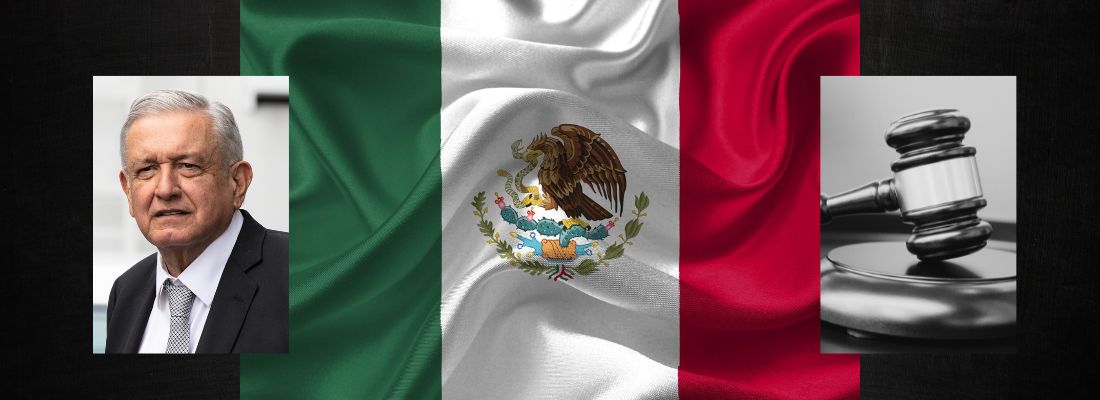Mexico: The IBA expresses concern over President Obrador’s interference with judicial independence
Tuesday 16 May 2023

Photo credit: EneasMx, CC BY-SA 4.0 , via Wikimedia Commons
ESPAÑOL
Statement by the President of the International Bar Association Almudena Arpón de Mendívil Aldama:
The International Bar Association (IBA) expresses concern over Mexican President Andrés Manuel López Obrador’s interference with judicial independence, following egregious and repeated remarks undermining the integrity of the country's Supreme Court.
On 18 April, Mexico’s Supreme Court ruled as unconstitutional the reform, backed by President López Obrador, to transfer the control of the civilian-led National Guard to the Army. Commenting on the decision the following day, President López Obrador lashed out at the country’s Supreme Court by claiming that the eight (out of 11) justices that struck down the legislation acted in ‘a factious way, following not legal, but political criteria, defending the old practices of the authoritarian and corrupt regime’.
These allegations fit into a broader context of criticism by the Mexican President on the integrity of the judiciary, targeting especially the country’s Supreme Court. To mention a couple of recent statements:
- On 23 March 2023, during a press conference, President López Obrador accused the Mexican federal judiciary of being ‘completely distorted’ and ‘impacted by corruption’, with a tendency to protect the elite and not the people. President López Obrador also compared judges with ten or more years of seniority to ‘gangsters’, based on the assumption that the more experience judges have in the system, the more likely they are to be corrupt.
- On 24 March, commenting on the decision from the Supreme Court to temporarily suspend part of a controversial reform pushed by President López Obrador that would have placed constraints on the work of the National Electoral Institute (INE), President López Obrador claimed that the Supreme Court is part of the ‘mafia of power’ and that its ‘only god is money’.
The proposed reforms that were halted by the Supreme Court also represent a cause of concern to the IBA. They seem to move in the direction of dismantling some of the checks and balances that are key to ensuring that the executive does not act outside of its constitutional bounds. The attempted reform to the INE – one of the country’s most respected institutions – would slash its budget in a way that would significantly weaken its ability to organise and oversee elections. In this manner, the institute’s supervisory powers would be curtailed. The increased role that President López Obrador wants to grant to the military in Mexico’s public life is similarly troubling. It carries the risk of creating distortions in the boundaries between the civil and military spheres avoiding standard checks over the new activities to be developed by the military. Such reforms, if passed, coupled with other manoeuvres to re-centralise power and militarise the country, would determine a democratic backsliding for Mexico.
Against this backdrop, President López Obrador’s injurious statements against the Supreme Court take on even greater significance. Similar remarks erode public confidence in the judiciary, are an affront to the rule of law, and undermine Mexico's democracy. They are in breach of international law principles and standards. Principle 1 of the United Nations Basic Principles on the Independence of the Judiciary clearly sets out that ‘it is the duty of all governmental and other institutions to respect and observe the independence of the judiciary’ in order for it to ‘decide matters before them […] on the basis of facts and in accordance with the law, without any restrictions, improper influences, inducements, pressures, threats or interferences, direct or indirect, from any quarter or for any reason’. Article 3 of the Inter-American Democratic Charter stipulates that ‘[e]ssential elements of representative democracy include, inter alia, respect for human rights and fundamental freedoms, access to and the exercise of power in accordance with the rule of law, […] and the separation of powers and independence of the branches of government’. In the same vein, the Inter-American Court of Human Rights has clarified in many instances that ‘one of the main objectives of the separation of the public powers is to guarantee the independence of judges’.
Strong public institutions are one of the bedrocks on which a mature democracy is built. It is in President López Obrador’s interests to have a solid, independent and respected judiciary as it legitimises his political action. By being a watchdog of the constitutional order, the judiciary can certainly block the reforms that contravene that order, like the INE and National Guard ones. However, on the other hand, when courts endorse governmental policies, they confer upon them an even stronger authority. Conversely, continuing down the route of institutional debilitation is bound to lead to a constitutional crisis that will jeopardise the rule of law in the country and threaten the hard-won rights of the Mexican people.
An independent judiciary is a key pillar of any modern democracy and a healthy rule of law system. Preserving public trust and confidence in the judicial institutions is essential for them to be able to fulfil their duty to uphold the law and protect citizens' rights. The Mexican President's allegations not only directly undermine respect for the judiciary, but also intimidate judges and prevent them from independently carrying out their functions. They create a climate of fear that has a chilling effect on the ability of judges to constrain the abuses of power of the executive. In the event of credible allegations of misconduct and corruption, the institutional legal routes for accountability should be pursued, rather than making unsupported direct accusations in the public sphere.
The IBA urges President López Obrador to respect the independence and integrity of Mexico's judiciary in a manner consistent with the rule of law and Mexico’s international obligations. The IBA calls on President López Obrador to work with the judiciary and legal profession to address any legitimate concerns regarding their functioning with the aim to strengthen democratic institutions and the rule of law in the country.
ENDS
